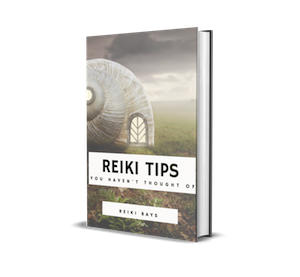Many, if not, most Reiki teachers strongly encourage their new Level 1 Reiki students to practice daily self-Reiki. Countless Reiki teachers diligently practice Reiki for daily self-care and emphasize to their students that it is a foundation of the system of Reiki. It may, therefore, be disconcerting to us to learn that some of our Reiki students are, in fact, not doing so.
I am a Reiki teacher who cares a lot that newly trained Reiki practitioners feel comfortable and empowered to practice self-Reiki every day, just like many of you care. I do believe there is work we can do to create classes full of confident Reiki practitioners who will make their goal of daily self-Reiki a concrete reality. The work we can do to facilitate more widespread Reiki self-care among our students centers around the concept of self-efficacy.
In general terms, virtually everyone can identify goals they wish to achieve and things they would like to change. Yet, most people also realize that translating their goals and wishes into action is not always so simple. What does it take for a person to tackle goals, tasks, and challenges? For decades, it has been known that perceived self-efficacy is a major determinant of what people will tackle and accomplish. Self-efficacy is, simply, a person’s belief in his or her capabilities to succeed in a given situation and/or at a particular task (Bandura 1977).
Self-efficacy plays a role in two contexts when it comes to Reiki practice. The first context is self-Reiki. That is, the student’s level of self-efficacy in terms of his or her capability to adopt a new behavior (practicing daily self-Reiki). The second context of self-efficacy is even more profound and operates at a more pervasive level. That is, how Reiki practice can facilitate movement from low to high self-efficacy in all endeavors in which a person finds him/herself. An individual who has completed Reiki training, and who begins to practice daily self-Reiki, may find that he or she is more successful in adopting other health-promoting behaviors, such as quitting smoking or losing weight, because of increased self-efficacy.
Reiki teachers can help their students develop self-efficacy. According to Albert Bandura, there are four major sources of self-efficacy:
1. Mastery Experiences
Bandura explained that a valuable way of developing a robust sense of self-efficacy is through mastery experiences. Performing a task successfully fortifies a person’s sense of self-efficacy. The converse is also true; failing at a task undermines self-efficacy. What can Reiki teachers learn from this first source of self-efficacy? When we teach, we must build in mastery experiences for our students. For example, we can aside at least 20 minutes during a Reiki Level 1 training for students to find a comfortable space and practice self-Reiki. We can do this more than once during a training and we certainly do not have to limit this to a Reiki Level 1 training; it is also fitting for a Reiki Level 2 training. Furthermore, each time the class re-convenes after a break of some kind, the students can settle back together by doing 5 minutes of self-Reiki in the class setting. Students would have a chance to address any concerns and ask any questions they may have about their self-Reiki experience and have the teacher facilitate a discussion right away. This immediate feedback would also contribute to the self-Reiki mastery experience, as our students gain a personal sense of control over the process of self-Reiki.

2. Social Modeling
This refers to observing other people successfully complete a task. Seeing people similar to oneself succeeding through their sustained effort is ‘catchy’. The observer realizes that he or she too possesses the ability to master the task. There are a couple of ways Reiki teachers can facilitate social modeling opportunities. A teacher who hosts a Reiki Share for his/her students, colleagues, and newcomers can begin the event with self-Reiki in the group setting. This would provide a social modeling experience for the new Reiki practitioners who are assembled. New members of the Reiki community attending a Reiki Share would see that self-Reiki is what Reiki practitioners do when they gather. Also, Reiki practitioners who have, perhaps, faltered in their self-Reiki practice, may well feel strengthened anew while witnessing their colleagues’ efforts. Secondly, teachers who write about and discuss their experiences with self-Reiki and its benefits are providing social modeling to their students.
3. Social Persuasion
People can be persuaded to believe that they have the capability to succeed. By Reiki teachers offering genuine encouragement, students can overcome self-doubt and focus on putting forth their best efforts to practice self-Reiki. We can encourage our Reiki students best by being very specific with our encouragement. For example, a generic “go home and do self-Reiki” is less persuasive than working with students in the class to create precise scenarios of how they will specifically carve out time and space for self-Reiki in their lives so that it becomes part of their daily lives. As Reiki teachers we can also utilize Social Persuasion to facilitate students’ self-efficacy when we share personal anecdotes that give a range of concrete benefits that self-Reiki has brought us. These anecdotes can range from a new-found ability to stay calm during a job search to alleviating symptoms from a health condition.
4. Psychological Responses
Bandura notes that people’s moods, emotional states, physical reactions, and stress levels can all affect their sense of self-efficacy. Reiki teachers can be of help here. In our classes and in our ongoing contact with our students, we can reinforce all of the components of the system of Reiki (self-practice, meditations and contemplating the Precepts) to assist our students in learning how to minimize stress in their lives, thus supporting their improved self-efficacy and their opening the door to Reiki self-practice.
As Reiki teachers, we can commit ourselves to strengthening our students’ sense of personal efficacy. This process is self-reinforcing, because once a practice is initiated, the students with high self-efficacy will invest more effort and persist longer than students who have not been guided toward improved self-efficacy. The stronger the students’ self-efficacy, the deeper their perseverance, and the greater the possibility they will experience and enjoy the dual benefits of increased self-efficacy—on the one hand, the many physical, emotional, and spiritual benefits that will flow from daily self-Reiki; and on the other hand, an ongoing improvement in self-efficacy that can be put toward any health-promoting and life-enhancing behaviors.
Bandura, A.(1977). Self Efficacy: Toward a unifying theory of behavioral change. Psychological Review, 84. 191-215.
Article by Reiki Master Elise Brenner
Free eBook download: We’ve created an eBook with our best articles on this topic, and offer it for free to all our newsletter subscribers.


Elise Brenner (Pronouns: she/her), PhD, Assistant Teaching Professor in the Departments of Public Health and Sociology at Simmons University in Boston, Massachusetts, Reiki Practitioner & Teacher and Mindfulness Meditation Teacher, is committed to wellness equity in all of the services she provides. The owner of Brenner Reiki Healing in Newton, Massachusetts, Elise provides comprehensive training in all levels of Reiki, having trained physicians, nurses, social workers, physical therapists, teachers, and people of all ages and backgrounds. Brenner has provided Reiki training for staff at Boston’s Beth Israel Deaconess Medical Center staff, Edith Nourse Rogers Veterans Administration Hospital in Bedford, MA, and Tufts Medical Center in Boston. Brenner is the co-author of the 2022 book, Reiki: A Self-Practice to Live in Peace with Self and Others, published by John Hunt Books.
Elise has a clinical Reiki and Mindfulness practice in which she provides individualized Reiki and Mindfulness sessions to people who are experiencing physical, mental, and emotional distress. Brenner further provides Reiki and Mindfulness outreach workshops and presentations to organizations, incorporating mind-body skills for the staff and populations they serve, including the Livestrong Program at the YMCA; Harbor Health Elder Service Plan in Boston; support groups for survivors of domestic abuse; support groups for individuals struggling with Vestibular Disorders; psychosocial support groups for cancer patients; support groups for carers of those with chronic conditions.
As an anthropologist, Elise Brenner has researched cross-cultural healing practices, thereby enriching the scope and depth of her Reiki and Mindfulness practice. Elise savors time in the woods and has begun to compose eco-poetry.
Email: [email protected]
Website: www.BrennerMindfulPaths.com




Elise thank you for this insightful article on Self Reiki practice. I think those of us who are very comfortable with daily self Reiki practice feel like it is such a simple thing that why doesn’t everyone do daily self Reiki. I think that some forget to do self Reiki even though they are well intentioned. It is important for those of us who teach Reiki classes ( Reiki Masters) to be living examples of what daily self Reiki can accomplish. You are a living example of just that.
I appreciate all that Elise Brenner has done and continues to do in Massachusetts to help build a better Reiki community. Reiki can be a very simple practice when taught this way. Self-practice and the precepts it can’t get any better than that! Well thought-out article, proud of you Elise!